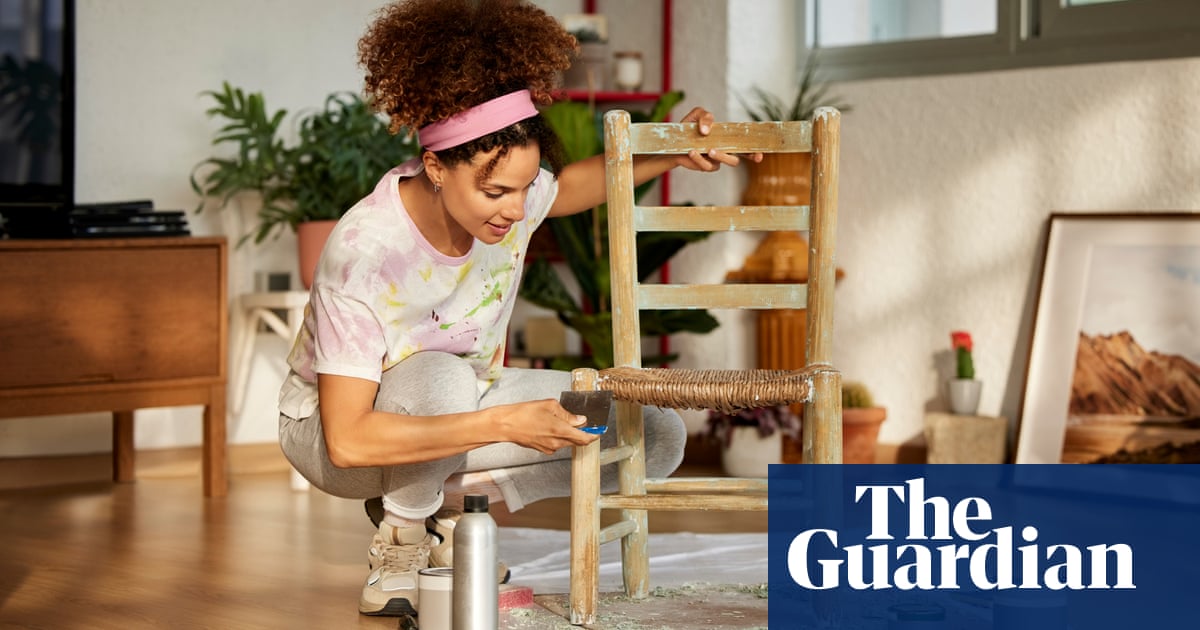
With summer fast approaching, it is the perfect time to put on your old paint-splattered shirt and do some DIY, giving your living spaces a new lease of life.
We have gathered advice from experts on how to elevate your home’s interiors without breaking the bank.
Kitchen
Georgina Burnett is an upcycling and interiors expert on ITV’s This Morning, and has her own website offering tips. She suggests updating kitchen units with paint.
“If you are skilled at painting and have the time, it’s something you could try,” she says. “I’d recommend you take the doors off the hinges and turn your kitchen floor into a painting station.
“Some great hard-wearing paints are on the market for kitchen units. But a decent eggshell will also do.”
Burnett says to start by thoroughly cleaning any surface you are painting. “It’s best to use sugar soap or methylated spirit,” she says. “They remove grease and grime that might stop the paint from sticking. Wash all surfaces afterwards with fresh water and allow them to dry. If your cupboards are solid wood, you could sand them. But, whether they are wood or veneer, you can use a multi-surface primer. It sticks to most materials and finishes.”
If you are painting on to bare wood, there are other primers to use.
You should only need one coat of the base. You will probably have to wait at least an hour before adding a top coat, Burnett says, although it is best to check the instructions on the product. She says you will need at least two coats of a top coat.
Among the best paint brands, the Painters World website suggests Zinsser AllCoat for cabinets, and says you may not need a primer. It costs £18 for a litre, which should cover 10 sq metres (107.63 sq ft).
“Some decorators prefer to use spray application. It gives a slightly different finish. But you need plenty of space for this,” Burnett says. She explains that this is because the paint gets in the air and it can be quite messy when done indoors.
“Even outside I’d wear a mask but inside you just need to protect your surroundings where you don’t want the paint to go,” she adds.
Trying sample paints first will help you pick a colour. Or paint lining paper and stick it to units to see how it looks.
Sophie Clemson, a director and co-founder of the affordable online interior design company the Living House, says changing handles on kitchen cupboards can also be a great hack.
“You’ll be surprised at how much this can change the [look of the] space,” she says.
“Also, depending on how much storage you have, consider whether you could remove a few of the wall cupboards and replace them with shelving – this will create a more open and modern feel. You could buy some scaffolding boards and use them as shelves.”
Clemson says B&Q is a good place to look for affordable and stylish kitchen handles. She says: “I particularly love the Chervil brass handles [£7 for a pack of two at the time of writing], which would work great with a shaker-style kitchen.
“Depending on how many handles you need and if you could stretch your budget a little further, Plank Hardware has a beautiful range of handles [£10 for one] that will instantly update your kitchen cupboards.”
She says you could pick something simple, such as the Mercury curved lip pull handle, which costs £9.95, or something more decorative, such as the Bobbin single T handle (£12.95).
Bathroom
Good paint is a cost-effective way to update the walls and tiles in your bathroom, Clemson says. “Perhaps you’ve just moved in and the tiles are quite dated. Simply painting them white will modernise your bathroom,” she says.
Rust-Oleum offers a wide selection of bathroom tile paint for only £24.99 a tin. It also has paint specifically designed to freshen up the grout, which may be a time-consuming task, but once completed, it will make a huge difference to your bathroom, Clemson says.
She adds: “Flooring can be a costly and big job to change; however, with self-adhesive floor tiles like Floorpops, you can easily elevate your bathroom flooring with a stylish design.” A pack of 10 tiles – each tile is about 0.6 inches thick – can be picked up for about £16. They will cover roughly about 10 sq ft.
Self-adhesive floor tiles are an easy DIY trick, she says, “as you can simply cut the tiles with a Stanley knife, and no expensive tools are needed”. They could be a great option for renters who want to make a change but also need any addition to be easy to remove.
The interior designer Amanda Foster suggests incorporating inexpensive accessories such as colourful towels, a new shower curtain or a statement mirror. “Swapping out old hardware like taps and light fixtures can also make a big impact,” she says.
Living room
Clemson says there are finishing touches that can make a room feel cosier and “uplift” it, such as cushions and throws. “For affordable cushions, look at cushion covers from places like H&M Home or Dunelm, then simply pop in a feather-filled insert, and they will look much more plump and expensive.”
H&M has cushion covers that cost from £2.99. “There are so many lovely plains and patterns to choose from,” she says. Her current favourites include a patterned cushion cover in light beige at £3.99, and a linen blend cushion cover available in a variety of colours for £9.99. She recommends getting cushion inserts from online retailer Homescapes (£5.29-£24.99), Dunelm (£5-£16) or John Lewis (£8-£16).
Clemson also advises adding plants, and says they do not need to be expensive and could be sourced from your local supermarket. “When choosing plants, you need to ensure they will thrive in the natural light of the room. You may be purchasing a plant for a particular spot in your home, but if it’s not ideal, it won’t last long,” she says. “I would recommend trailing succulents, as these can spruce up any shelves and draw your eye up, or go for a tall floor plant like an Areca palm that will make maximum impact in the room.”
Poppy Ashworth, an interior expert from the wall decoration maker Graham & Brown, suggests using paint playfully to create different zones in a room. She says: “That could include a square block of paint in an open-plan space to create an office area.
“We also see a lot of archways being painted – that could become a nook in the corner of a room. You could also add a nice sofa there.”
She says that instead of adding dado or picture rails, you could paint your ceiling a colour and carry it on at the top of the wall.
“Paint the whole ceiling and then take it down maybe 10 to 20cm from the roof and it just stops there directly, so it floods from the roof and brings colour into a different area you would not necessarily paint. It will add depth,” she says.
Ashworth says splashes of wallpaper can be a good idea. “I have seen people reupholster drawers with wallpaper inside or use it in open-plan shelving units,” she says. “They add wallpaper on the back and paint the shelves themselves – it adds depth and texture.”
Georgia Metcalfe, the founder of the furniture boutique French Bedroom, says restyling a space can elevate a room without the need to redecorate or introduce new furniture.
“Soft furnishings are the perfect starting point, regardless of which room you are working on. For bedrooms, it can be as simple as switching out your bed linen and cushions,” she says.
Metcalfe recommends French Bedroom’s Apricity Peach Fuzz Crinkle Bed Linen Set (Double Set) for £60. “Terracotta and peach tones are not only the colours of the moment, they bring warm summery tones into your room and pair perfectly with natural wood and the fresh greens of house plants,” she says. “The seersucker texture of the fabric means it doesn’t need ironing, and at £60 for a double set makes it not only low maintenance but low cost, too.”
Foster says you can style a space with “thrifted” or secondhand finds from charity shops or online marketplaces. “For example, you could transform an old sidetable with a fresh coat of paint and use it as a nightstand, or frame a vintage poster to create a one-of-a-kind piece of wall art.”
She adds:“When it comes to painting furniture, I recommend using a high-quality paint formulated for furniture, and always prepping the surface properly to ensure a smooth, long-lasting finish. This might involve sanding, priming or even using a chalk-based paint for a matt, vintage-inspired look.”
Foster says another upcycling idea is to add decorative hardware or trim to a plain piece of furniture. She notes that this can “instantly elevate the look and make it feel more custom … You could add brass or copper pulls to a dresser, or use decorative moulding to transform a basic bookshelf into a statement piece. The possibilities are endless.”
Claire Garner, a director at Claire Garner Interiors, advises clients to use off-the-shelf furniture such as the Pax range from Ikea, and then employ the services of a carpenter, who can tailor it to fit your specific space. “Although not comparable to fully bespoke joinery, this option can still create a premium, professional finish without breaking the bank,” she says.
She says “layering” light throughout the room can also make a big difference in terms of changing the atmosphere. “This involves strategically placing various light sources to create depth and dimension – for example, adding a statement floor lamp in a reading nook can provide focused illumination while also adding visual interest,” she says.
She recommends a Cooper wall fitting from the lighting company Pooky that costs £181. She also suggests a table lamp from Anthropologie that retails at £198. For a cheaper option you could get a Voyager wall light for £24 from Dunelm. There is also a rattan table lamp from Sklum for £54.
But you might be able to manage a revamp without spending anything at all. “Sometimes, simply rethinking the room layout can spruce up the space at no cost,” she says. “Moving furniture away from the walls or changing the arrangement can breathe new life into a space.”












